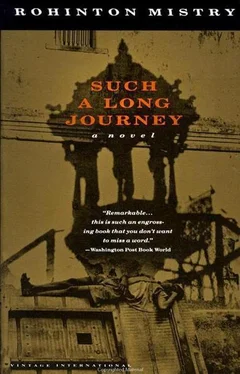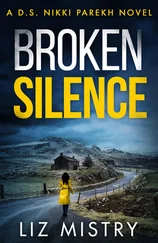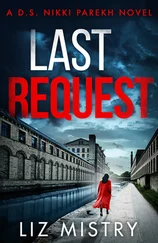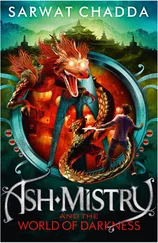Armed with Dustoorji Baria’s specifications, Mr. Rabadi went shopping. It was a great relief for everyone in Khodadad Building when Tiger’s successor turned out to be a little white Pomeranian called Dimple. Gustad’s bushes held no special charm for Dimple because, by this time, all of Darius’s departed fishes and birds had thoroughly decomposed. But the resentment between the two men did not decrease or disappear.
‘The dogwalla idiot will say anything,’ said Gustad. ‘Where is Darius now?’
‘Still playing outside, I think.’ Dilnavaz swatted with a newspaper. ‘What a nuisance, so many flies.’
‘That disgusting wall,’ said Gustad. ‘And after it’s dark the mosquitoes will come. I saw flocks of them today.’
When Darius arrived at dinner-time, Gustad demanded to know exactly what had happened. ‘Nothing!’ said Darius indignantly. ‘Sometimes I talk to Jasmine if she is there with my friends. I talk to everyone.’
‘Listen. Her father is a crackpot. So just stay away. If she is with your friends, you don’t join them.’
‘That’s not fair,’ protested Darius. But the truth was, Jasmine was the only reason he saw his friends so often of late. The melting effect that her soft brown eyes had on him was delicious, a feeling he had never known.
‘Fair or not fair, I don’t care. I don’t want the dogwalla idiot complaining again. Discussion over. Let’s have dinner.’
But dinner was quite a challenge, with flies buzzing and hovering over the food, and mosquitoes dive-bombing everywhere. Roshan shrieked each time one landed in her plate, while Darius tested his reflexes by trying to catch them on the wing. ‘Shut all the windows tight,’ said Gustad, ‘and we’ll kill the ones inside.’ Everyone was sweating in the heat before long, however, and the windows had to be opened.
Somehow they got through dinner. ‘People keep pissing on the wall as if it was their father’s lavatory,’ said Gustad, slapping his neck and prying off a dead mosquito. In the medicine section of the sideboard he found a small half-used tube of Odomos. ‘Have to buy another one tomorrow. The mosquitoes will make the Odomos manufacturers fat, that’s all.’ They shared what was left in the tube in order to get through the night.
Gustad inquired hopefully, every day, when he came home from work, if Jimmy had written. But a fortnight later, there was still no word from the Major about the favour he wanted. One evening, Roshan rushed to the door as she heard his key rattle. ‘Daddy, can I have a rupee for school? Mother Claudiana said during assembly that tomorrow is the last day to join the raffle and the prize is a beautiful imported doll from Italy which is as tall as me with a long white wedding dress and she also has blue eyes.’ She stopped to inhale.
He drew her to his side and hugged her. ‘My sweet little bakulyoo ! So much excitement? You will become like Tehmul-Lungraa, talking fastfastfast.’
‘But can I have one rupee?’
‘This is the problem with convent schools. Money, all the time, money for Mother Superior with her big wide posterior.’
‘Tch-tch,’ said Dilnavaz, ‘not in front of her,’ as Roshan giggled.
‘Tell me, did Mother Claudiana say what she would do with the raffle money?’
‘Yes,’ said Roshan. ‘She said half will go for the new school building. And half will help the refugees.’
‘And do you know what “refugee” means?’
‘Mother Claudiana told us. They are people who ran away from East Pakistan and came to India because the people from West Pakistan are killing them and burning all their homes.’
‘OK. One rupee for you.’ He opened his wallet. ‘But remember, it does not mean you get the doll. It’s a raffle.’
‘Yes, yes, Daddy, Mother Claudiana explained. We will all have a number, and the girl whose number is picked will get the doll.’ She folded the rupee, took the pencil-box from her school-bag, and tucked the rupee under the ruler. ‘Daddy, why is West Pakistan killing the people in East Pakistan?’
Gustad undid his tie and smoothed it where the knot had been. ‘Because it is wicked and selfish. East Pakistan is poor, they said to West, we are always hungry, please give us a fair share. But West said no. Then East said, in that case we don’t want to work with you. So, as punishment, West Pakistan is killing and burning East Pakistan.’
‘That is so mean,’ said Roshan, ‘and so sad for East.’
‘Lot of meanness and sadness in this world.’ He hung up his tie and unbuttoned his cuffs, then asked Dilnavaz for the mail. Nothing from Jimmy, but there was an envelope from an education trust fund. He added the application form to the ones that had collected over the last few weeks. ‘Look at that,’ he said bitterly, hitting them with the back of his hand. ‘All the places I went to for the ungrateful boy.’ He held up the forms one by one. ‘Parsi Punchayet Education Fund. R. D. Sethna Trust. Tata Scholarships. Wadia Charities For Higher Studies. All of them I went to, touched my forehead, joined my hands, and said sir and madam and please and thank you a hundred times to make them promise scholarships. Now your Lord Lavender says he is not interested in IIT.’
Dilnavaz put the forms neatly together. ‘Don’t get upset, it will be all right. God is great.’
Every day after sunset she had described the seven clockwise circles over Sohrab’s head. And still nothing. I must have been crazy to think there was even a chance. On the other hand, Sohrab and Gustad did not shout or argue like they used to, touch wood. Could that not be because—?
‘What he will do if he does not go to IIT, God knows.’
She shuffled the forms. ‘He told you he wants to continue at his college.’
‘And that is called doing something? A useless BA?’
So the days went by with Gustad sad and angered by his son’s betrayal, anxious about Jimmy Bilimoria’s letter that would not come, and maddened by the clouds of mosquitoes that came, without fail, after sunset. ‘Ignorant swine pissing on the road should be shot on the spot!’ he would say. Or, ‘Blow up the bloody wall with dynamite, then where will they shit?’ This last showed the extent of his frustration, for the wall was dear to him.
Years ago, when Major Bilimoria had first moved to Khodadad Building, when the water supply was generous and the milk from Parsi Dairy Farm was both creamy and affordable, there had been a surge of construction activity everywhere in the city. The neighbourhood of Khodadad Building was not spared either, and tall structures began going up around it. The first to be blotted out was the setting sun — an office building was erected on the west side. Although it was only six stories, that was enough, for Khodadad Building was but three, being short and wide: ten flats in a row, stacked three high, with five entrances and stairways for each adjacent set of flats.
Shortly afterwards, construction started to the east as well. It was clear to all thirty tenants that an era had ended. Fortunately, the work dragged on for over ten years because of cement shortages, labour problems, lack of equipment and, once, the collapse of an entire wing due to adulterated cement, resulting in the deaths of seven workers. Youngsters from Khodadad Building went to the construction site to gaze in awe at some dark blotch on the ground, and wondered if that was the spot where the seven had perished, where their lifeblood had oozed out. The delays provided respite for Khodadad Building, and in time there grew a gradual acceptance of the altered landscape.
With the increase in traffic and population, the black stone wall became more important than ever. It was the sole provider of privacy, especially for Jimmy and Gustad when they did their kustis at dawn. Over six feet high, the wall ran the length of the compound, sheltering them from non-Parsi eyes while they prayed with the glow spreading in the east.
Читать дальше












